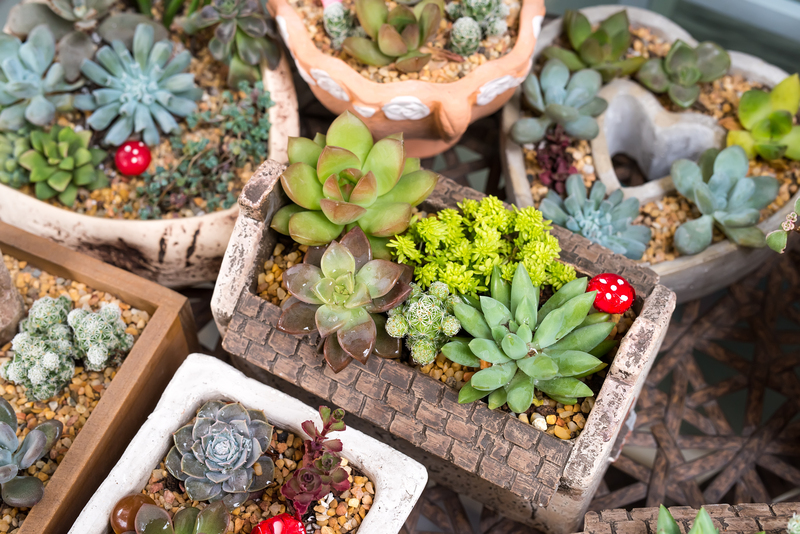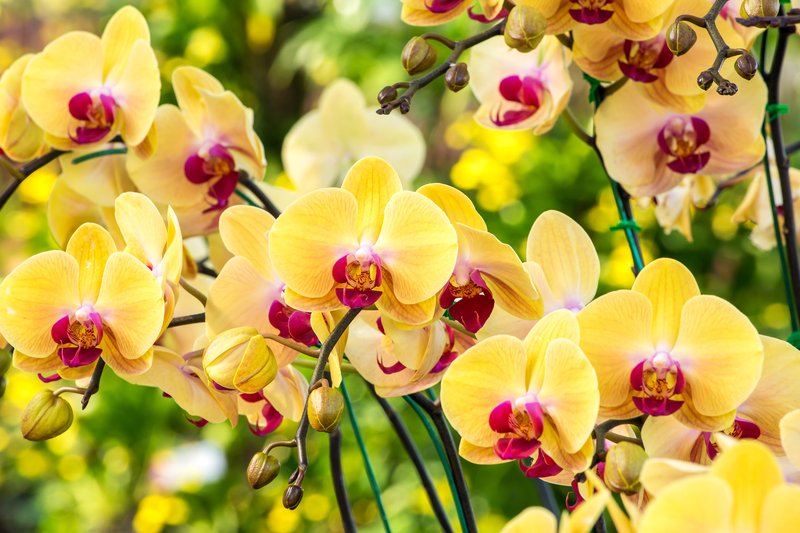Organic Discards to Garden Enrichment
Posted on 14/08/2025
Organic Discards to Garden Enrichment: Transforming Waste Into Garden Gold
As sustainability becomes a guiding principle for homeowners and gardeners alike, the concept of turning organic discards into garden enrichment has taken root worldwide. Instead of sending food scraps and yard waste to overburdened landfills, we can harness their hidden potential--turning trash into treasure for our gardens. This comprehensive guide will show you how to convert household and organic waste into nutritious amendments that breathe new life into your plants, boost soil health, and help the environment.

Why Convert Organic Waste Into Garden Enrichment?
Every year, millions of tons of organic waste are discarded in the form of kitchen scraps, yard trimmings, coffee grounds, and more. Though seemingly harmless, when these materials decompose in landfills without oxygen, they produce methane--a potent greenhouse gas. By instead recycling these organic materials as garden enrichers, communities can significantly reduce their carbon footprint while fostering healthy, vibrant gardens at home.
- Lower landfill waste and reduce greenhouse gas emissions
- Enrich soil with essential nutrients and beneficial microbes
- Save money on fertilizers and soil conditioners
- Encourage sustainable gardening practices
Types of Organic Discards Valuable for Gardens
Not all waste is created equal--some household discards are veritable superfoods for your garden, while others should be avoided entirely. Below, we'll look at the best organic discards to use, and which to avoid.
Good Organic Discards for Enriching Soil
- Vegetable and fruit peels (carrot tops, potato skins, apple cores, etc.)
- Coffee grounds (add nitrogen and help repel pests)
- Eggshells (rich in calcium for combating plant diseases)
- Lawn clippings (fresh, green sources of nitrogen)
- Leaves (add carbon and improve soil structure when shredded)
- Tea bags (ensure they contain only biodegradable materials)
- Cardboard and newspaper (as mulch or compost "brown" material)
Organic Materials to Avoid
- Meat and dairy products (can attract pests and produce odors)
- Oily or greasy foods (slow decomposition, encourage vermin)
- Diseased plants or weeds with seeds (spread disease or weeds)
- Pet waste (can contain harmful pathogens)
Simple Methods to Transform Organic Discards Into Garden Enrichers
Ready to revolutionize your gardening routine? Here are several *practical and accessible* ways to put organic refuse to work enriching your garden.
1. Classic Composting
Composting is the most popular method to recycle kitchen and yard scraps, converting raw waste into rich, earthy humus--nature's best soil amendment. Classic backyard composting involves creating an optimal balance between nitrogen-rich "greens" (like food waste and grass clippings) and carbon-rich "browns" (like shredded leaves and cardboard).
- Build a compost pile or bin in your backyard or use a tumbler for convenience.
- Add a mix of green and brown materials for proper carbon-to-nitrogen balance.
- Aim for a ratio of roughly 2:1 "browns" to "greens".
- Moisten the pile and turn it regularly for oxygen and uniform decomposition.
- After 2-6 months, harvest the finished compost and add it to garden beds, container soils, or around trees and shrubs.
2. Vermicomposting (Worm Farming)
Vermicomposting, or composting with worms, is ideal for small spaces and indoor gardeners. Red wiggler worms convert food waste into nutrient-rich castings--excellent for potted plants and vegetable gardens.
- Use a shallow worm bin with proper bedding (moistened shredded newspaper or cardboard).
- Add food scraps in small amounts, covered with bedding material to avoid odors.
- Harvest worm castings every few months for exceptionally rich fertilizer.
3. Bokashi Composting
The Bokashi method is a Japanese process that ferments organic waste in a sealed container using beneficial microbes. It's fast, compact, and can handle small amounts of meat or dairy. After fermentation, bury the pre-composted material in the garden to complete decomposition, enhancing soil fertility and microbial diversity.
4. Direct Application (Trench Composting)
<_em>Trench composting is perhaps the simplest way to recycle organic discards: Dig a hole or trench, bury your waste, and cover it with soil. Over time, the waste breaks down in place, feeding plants directly. This method is particularly good for vegetable gardens and annual borders.
5. Mulching With Organic Discards
Not all organic waste needs to be composted first. Some materials, like grass clippings and shredded leaves, make excellent mulch. Spread them directly on garden beds to conserve moisture, suppress weeds, and add nutrients as they break down.
Nutritional Benefits: How Organic Waste Enriches Garden Soil
The core benefit of converting organic discards into garden amendments is their powerful effect on soil and plant health. Here's what your garden gains:
- Improved soil structure and aeration
- Increased moisture retention and reduced need for watering
- Enhanced nutrient content (nitrogen, phosphorus, potassium, calcium, etc.)
- Inoculation with beneficial microbes for healthier root systems
- Stimulation of worm and insect life, which further boosts fertility
- Gradual improvement of heavy or sandy soils
Organic Discards for Specialty Uses in the Garden
Beyond broadly enriching the soil, organic waste can serve specific garden functions:
Eggshells for Blossom-End Rot Prevention
Crushed eggshells are a time-honored remedy to add calcium to tomato and pepper plants, preventing blossom-end rot.
Coffee Grounds as Pest Repellent
Sprinkling used coffee grounds around young seedlings can deter slugs and snails. They also add nitrogen and trace minerals to soil.
Sawdust and Wood Ash for Soil Amendment
- Wood ash supplies potassium and raises soil pH (great for acidic soils)
- Composted sawdust improves tilth and serves as a carbon-rich amendment
Step-by-Step Guide: Starting a Compost System at Home
Begin your journey from organic discards to garden enrichment with these easy steps:
1. Select Your Composting Style
- Traditional pile/bin for outdoor spaces
- Tumbling bin for convenience
- Worm bin or Bokashi for apartments and small spaces
2. Choose a Location
- Shady, well-drained spot is best
- Near a water source makes maintenance convenient
3. Add Materials
- Alternate between carbon (brown) and nitrogen (green) materials
- Chop or shred materials for faster decomposition
- Keep pile moist but not soggy
4. Turn and Monitor
- Mix the pile weekly to aerate and speed decomposition
- Check temperature (hotter piles break down faster)
5. Harvest and Apply
- When compost is dark, crumbly, and earthy-smelling, it's ready
- Mix into topsoil or use as mulch around plants and trees
Common Problems and Solutions for Homemade Compost
Turning organic discards to garden enrichment isn't without challenges. Here's how to troubleshoot:
- Odors: Add more "browns," turn pile for aeration, avoid meat/fatty scraps
- Pile not heating up: Add more greens, moisten, and turn for oxygenation
- Pests: Bury food scraps, use sealed bins, don't add meat or dairy
Advanced Tips for Supercharging your Organic Waste Recycling
1. Layer for Results
Create "lasagna" style garden beds by layering organic refuse, compost, and leaf mold--producing rich, no-dig soils for vegetables.
2. Use Compost Tea
Soak your finished compost in water for several days to make a nutrient-rich liquid fertilizer for foliar feeding or watering needy plants.
3. Set Up Community Composting
Collaborate with neighbors for larger-volume composting or join a local garden co-op to recycle even more organic discards and enrich public gardens.

Environmental and Economic Impact of Upcycling Organic Discards
Adopting organic waste recycling at home or community scale pays big dividends:
- Substantially lowers municipal waste management costs
- Reduces landfill methane output and waterway pollution
- Enhances food security through more productive home growing
- Fosters a closed-loop, regenerative approach to resource management
Conclusion: Make the Shift From Discards to Enrichment
Every banana peel, coffee filter, or handful of autumn leaves thrown away is a missed opportunity. By *embracing the philosophy of organic discards to garden enrichment*, you can transform what once seemed like trash into a powerful resource for a greener, lusher, and more bountiful garden. Whether you start a backyard compost pile, experiment with vermiculture, or simply mulch with your leaves, the journey from waste to wealth is a fulfilling one--for your plants and for the planet.
Take the first step today: collect your kitchen scraps, start a compost heap, and see firsthand how organic waste can revolutionize your garden and help build a more sustainable world. Happy gardening!
Latest Posts
Begin Your Garden Transformation with These Essentials
Discover New Ways to Handle Stubborn Weeds
Tailoring Your Garden Landscape for Dogs

